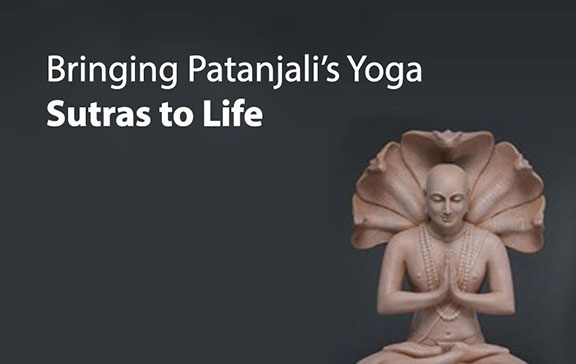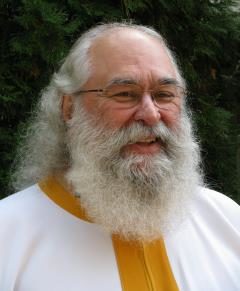 Rev. Jaganath, Integral Yoga Minister and Raja Yoga master teacher, has spent a lifetime delving into the deepest layers of meaning in Patanjali’s words within the Yoga Sutras. Our series continues with the 26th sutra of Chapter 1 in which Patanjali now talks about Ishvara as the “Guru or teacher of the most ancient Gurus.” In the prior sutra (1.25) Patanjali describes Ishvara as “omniscient.” So, what role does such a master teacher play in the life of Yoga student? This is what is now analyzed in this sutra.
Rev. Jaganath, Integral Yoga Minister and Raja Yoga master teacher, has spent a lifetime delving into the deepest layers of meaning in Patanjali’s words within the Yoga Sutras. Our series continues with the 26th sutra of Chapter 1 in which Patanjali now talks about Ishvara as the “Guru or teacher of the most ancient Gurus.” In the prior sutra (1.25) Patanjali describes Ishvara as “omniscient.” So, what role does such a master teacher play in the life of Yoga student? This is what is now analyzed in this sutra.
Sutra 1.26 pūrveṣaṃ api guruḥ kālena anavachchedāt
Unconditioned by time, Ishvara is the teacher of even the most ancient teachers (Swami Satchidananda translation). Not bound by time, Ishvara is the Guru of even the most ancient Gurus (Rev. Jaganath translation).
The teacher provides spiritual energy! Just like roots provide nutrients to the flowers.
—Master Choa Kok Sui
pūrveṣaṃ = the most ancient; the ones who came before, the previous ones
from pūrvam = before, formerly, hitherto, previously, former, being before or in front, prior, preceding, previous to, earlier than, ancient, old, an ancestor
api = even; expresses placing near or over, uniting to, annexing, reach to, proximity, and, also, moreover, besides, surely, as well as. Often used to express emphasis: very, even now, this very day
In this context, api is used to emphasize that Ishvara is not limited or conditioned by time and that the teachings, guidance, and wisdom of all Gurus are a reflection of the omniscience of Ishvara.
The focus of this sutra is on the omnipresence of wisdom and that the same wisdom, found in even the most ancient of Gurus, still flows through the masters of today, waiting to be fully awakened in us.
One benefit of this understanding is to keep the mind from longing for a past age of wisdom or of past great masters, now lost. Spiritual truths and the path to their realization, like love, eternally pierce through the layers of ignorance that veil every age and every place. Ishvara is the source of all redemptive knowledge and practices.
The same enlightening, redemptive wisdom found in the great Gurus is within all beings. Once kindled, this light continues to expand and grow brighter, purifying the mind and heart of ignorance.
guru = left untranslated; heavy, weighty, heavy in the stomach with food, difficult to digest, great, large, extended, long, high in degree, vehement, important, serious, valuable, highly prized, venerable, respectable, any venerable or respected person, spiritual preceptor, pregnant
from gur = to raise, lift up, to make an effort, or from gri = to invoke, to praise
It is important to realize the central place the Guru holds in Indian thought, and in all mystic traditions, East and West. The Guru is not what many today imagine. The Guru is not just a master teacher or speaker. Some Gurus spoke little or not at all. The Guru is not just the intelligence of an individual or the knowledge accumulated from years of study. The Guru is a conduit or embodiment of the qualities of Ishvara listed in the past two sutras. In fact, historically, great enlightened individuals were addressed as Ishvara, a practice that continues to this day.
Especially before the widespread use of books, the teachings and guidance of a Guru were by far the most important sources of wisdom teachings. To this day, in India, the words of great masters are valued over the written word.
The bond between the Guru and disciple is a powerful, respectful, and loving relationship. It is through the disciple’s dedication and willingness to be guided that the door to enlightenment swings open. The deepest and most transformational teachings are conveyed nonverbally through a process like osmosis. Words point to these truths, but are not themselves the truths. Too subtle for language, they are conveyed through example and the principle of spiritual resonance. The Guru Gita, a sacred text that details the nature of the Guru and the Guru–disciple relationship, presents this teaching as: only a lit candle can give light to an unlit one.
In this light, we can better understand why the great Gurus—past and present—were and are revered in the Yoga tradition.
Still, it is legitimate to question the need of a Guru in this day of easy to attain information, the multitude of Yoga centers, Yoga retreats, and Yoga teachers with impressive biographies all around us. No doubt, there have been those, called or considered Gurus, who have had either weaknesses or impure motives exposed. And there are those sincere seekers who have concerns with the idea of becoming a follower. The show of reverence to what obviously is, a human being, doesn’t sit well with them. They see devotion to a Guru as a loss of freedom. But one important spiritual truth should not be ignored: for those who are lost, guidance is freedom.
Anyone who feels that they have the means and wisdom to navigate through life without guidance doesn’t need a Guru, or at least they won’t be attracted to that relationship. But those who wish to make sense of what seems senseless in life, who wish to overcome fear, resentment, greed, anger, who suffer from these emotions even though they engage in regular practice, may find freedom in being shown direction and given support from an experienced guide.
About the Author:
 Reverend Jaganath Carrera is and Integral Yoga Minister and the founder/spiritual head of Yoga Life Society. He is a direct disciple of world renowned Yoga master and leader in the interfaith movement, Sri Swami Satchidananda—the founder and spiritual guide of Satchidananda Ashram–Yogaville and Integral Yoga International. Rev. Jaganath has taught at universities, prisons, Yoga centers, and interfaith programs both in the USA and abroad. He was a principal instructor of both Hatha and Raja Yoga for the Integral Yoga Teacher Training Certification Programs for over twenty years and co-wrote the training manual used for that course. He established the Integral Yoga Ministry and developed the highly regarded Integral Yoga Meditation and Raja Yoga Teacher Training Certification programs. He served for eight years as chief administrator of Satchidananda Ashram–Yogaville and founded the Integral Yoga Institute of New Brunswick, NJ. He is also a spiritual advisor and visiting lecturer on Hinduism for the One Spirit Seminary in New York City. Reverend Jaganath is the author of Inside the Yoga Sutras: A Sourcebook for the Study and Practice of Patanjali’s Yoga Sutras, published by Integral Yoga Publications. His latest book, Patanjali’s Words, is a work-in-progress.
Reverend Jaganath Carrera is and Integral Yoga Minister and the founder/spiritual head of Yoga Life Society. He is a direct disciple of world renowned Yoga master and leader in the interfaith movement, Sri Swami Satchidananda—the founder and spiritual guide of Satchidananda Ashram–Yogaville and Integral Yoga International. Rev. Jaganath has taught at universities, prisons, Yoga centers, and interfaith programs both in the USA and abroad. He was a principal instructor of both Hatha and Raja Yoga for the Integral Yoga Teacher Training Certification Programs for over twenty years and co-wrote the training manual used for that course. He established the Integral Yoga Ministry and developed the highly regarded Integral Yoga Meditation and Raja Yoga Teacher Training Certification programs. He served for eight years as chief administrator of Satchidananda Ashram–Yogaville and founded the Integral Yoga Institute of New Brunswick, NJ. He is also a spiritual advisor and visiting lecturer on Hinduism for the One Spirit Seminary in New York City. Reverend Jaganath is the author of Inside the Yoga Sutras: A Sourcebook for the Study and Practice of Patanjali’s Yoga Sutras, published by Integral Yoga Publications. His latest book, Patanjali’s Words, is a work-in-progress.

